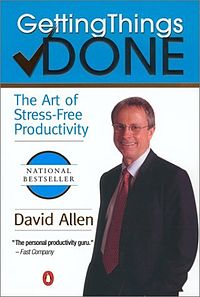- Getting Things Done
-
This article is about the action management system by David Allen. For other uses, see Getting Things Done (disambiguation).
Getting Things Done: The Art of Stress-Free Productivity 
Getting Things Done: The Art of Stress-Free Productivity coverAuthor(s) David Allen Subject(s) Business Publisher Penguin Publication date 2002 Pages 267 pp ISBN ISBN 978-0-14-200028-1
Reprint EditionOCLC Number 51540420 Getting Things Done (GTD) is an organizational method created by productivity consultant David Allen, described in a book of the same name.
The Getting Things Done method rests on the principle that a person needs to move tasks out of the mind by recording them externally. That way, the mind is freed from the job of remembering everything that needs to be done, and can concentrate on actually performing those tasks.
Contents
Methodology
In traditional time management, priorities usually play a central role. In contrast, Allen's approach uses two key elements — control and perspective. He proposes a workflow process to gain control over all the tasks and commitments that one needs or wants to get done, and "6 different levels of focus" to provide them with useful perspective.
The author advocates a weekly review focused on different levels, and suggests that the perspective gained from these reviews should drive one's priorities, which can in turn determine the priority of the individual tasks and commitments gathered during the workflow process. During a weekly review, the user determines the context for the tasks and puts them on the appropriate lists. An example of grouping together similar tasks would be making a list of outstanding telephone calls, or errands to perform while downtown. Context lists can be defined by the set of tools available or by the presence of individuals or groups for whom one has items to discuss or present.
GTD is based on making it easy to store, track and retrieve all information related to the things that need to get done. Allen suggests that many of the mental blocks we encounter are caused by insufficient 'front-end' planning. It is most practical, according to Allen, to do this thinking in advance, generating a series of actions which we can later undertake without any further planning. The human brain's "reminder system" is inefficient and seldom reminds us of what we need to do at the time and place when we can do it. Consequently, the "next actions" stored by context in the "trusted system" act as an external support which ensures that we are presented with the right reminders at the right time. Since GTD relies on external memories, it can be seen as an application of the scientific theories of distributed cognition or the extended mind.[1]
Reception
In 2005, Wired called GTD "A new cult for the info age",[2] describing the enthusiasm for this methodology among information technology and knowledge workers as a kind of cult following. Allen's ideas have also been popularized through the Internet, especially via blogs such as Lifehacker,[3] 43 Folders,[4] and The Simple Dollar.[5]
In 2005, Ben Hammersley interviewed David Allen for The Guardian, with an article called "Meet the man who can bring order to your universe",[6] saying "For me, as with the hundreds of thousands around the world who press the book into their friends' hands with fire in their eyes, Allen's ideas are nothing short of life-changing".
In 2007, Time Magazine called Getting Things Done the self-help business book of its time.[7]
In 2007, Wired ran another article about GTD and Allen,[8] quoting him as saying "the workings of an automatic transmission are more complicated than a manual transmission... to simplify a complex event, you need a complex system".
Software implementations
Although GTD material is careful to remain "tool agnostic" and in fact advises people to start with a paper-based system[9], many task management tools claim to be GTD compliant.[10] A wide spectrum of software exists, from commercial packages like Remember The Milk, OmniFocus, Things and ThinkingRock to open source applications such as Chandler to command-line implementations such as Taskwarrior. TiddlyWiki has long been used as a personal productivity tool geared towards Allen's GTD methodology.
See also
- Life hack
- Pomodoro Technique
- Taskwarrior
References
- ^ Francis Heylighen & Clement Vidal (2008): Getting Things Done: The Science behind Stress-Free Productivity", Long Range Planning 41, no. 6: 585-605.
- ^ Robert Andrews. "A new cult for the info age". Wired.com. http://www.wired.com/news/culture/0,1284,68103,00.html?tw=rss.TOP. Retrieved 2010-03-05.
- ^ "Best of GTD". Lifehacker.com. 2006-03-21. http://lifehacker.com/software/getting-things-done/best-of-gtd-161916.php. Retrieved 2010-03-05.
- ^ "Getting started with "Getting Things Done"". 43folders.com. http://www.43folders.com/2004/09/08/getting-started-with-getting-things-done. Retrieved 2010-03-05.
- ^ "Review: Getting Things Done". Thesimpledollar.com. http://www.thesimpledollar.com/2007/05/06/review-getting-things-done/. Retrieved 2010-03-05.
- ^ "Meet the man who can bring order to your universe". London: Technology.guardian.co.uk. 2005-09-29. http://technology.guardian.co.uk/businesssense/story/0,,1580180,00.html. Retrieved 2010-03-05.
- ^ Saturday, Mar. 03, 2007 (2007-03-03). "The Oracle of Organization". Time.com. http://www.time.com/time/magazine/article/0,9171,1595223,00.html. Retrieved 2010-03-05.
- ^ Wolf, Gary. "Getting Things Done Guru David Allen and His Cult of Hyperefficiency". Wired.com. http://www.wired.com/techbiz/people/magazine/15-10/ff_allen?currentPage=all. Retrieved 2010-03-05.
- ^ http://www.gtdtimes.com/2010/08/02/which-list-manager-should-i-use-for-gtd/
- ^ Forrister, Kelly. "Simply GTD with Kelly: Getting Started". davidco.com. http://www.davidco.com/blogs/kelly/archives/getting_started/. Retrieved 2010-08-22.
Further reading
- Allen, David (2001). Getting Things Done: The Art of Stress-Free Productivity. Penguin Books. ISBN 0-14-200028-0.
- Allen, David (2003). Ready for Anything. Viking Books. ISBN 0-670-03250-6.
- Allen, David (2008). Making it All Work. Viking Books. ISBN 978-0-7499-4103-1.
External links
Categories:- Management
- Self-help books
- Personal development
Wikimedia Foundation. 2010.
